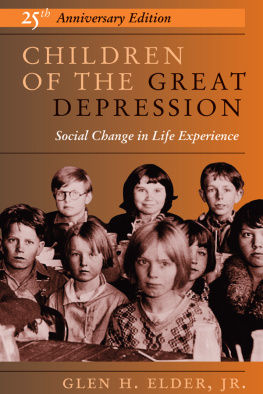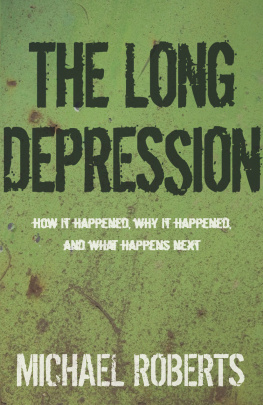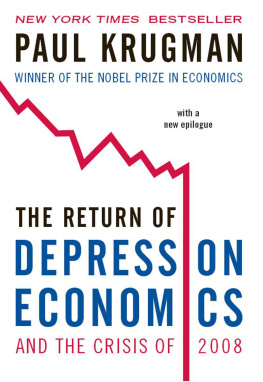Children
of the Great
Depression
Children
of the Great
Depression
Social Change Glen H. Elder, Jr.
in Life Experience

First published 1999 by Westview Press
Published 2018 by Routledge
711 Third Avenue, New York, NY 10017, USA
2 Park Square, Milton Park, Abingdon, Oxon OX14 4RN
Routledge is an imprint of the Taylor & Francis Group, an informa business
Copyright 1999 Taylor & Francis
All rights reserved. No part of this book may be reprinted or reproduced or utilised in any form or by any electronic, mechanical, or other means, now known or hereafter invented, including photocopying and recording, or in any information storage or retrieval system, without permission in writing from the publishers.
Notice:
Product or corporate names may be trademarks or registered trademarks, and are used only for identification and explanation without intent to infringe.
Library of Congress Cataloging-in-Publication Data
Elder, Glen H., Jr.
Children of the great depression: social change in life experience / by Glen H. Elder, Jr.25th anniversary ed.
p. cm.
Originally published: Chicago : University of Chicago Press,
c1974. With new introd.
Includes bibliographical references (p.) and index.
ISBN 0-8133-3342-3
1. Depressions1929United States. 2. FamilyCalifornia
OaklandLongitudinal studies. 3. StudentsCaliforniaOakland
Social conditionsLongitudinal studies. 1. Title.
HN80.018E43 1998
303.44097946dc21 98-27535
CIP
ISBN 13: 978-0-8133-3342-7 (pbk)
Contents
In this volume, Glen Elder gives us two classics in one. He does so by bringing together in one place two closely related bodies of his work, widely separated in their original date of publication, but highly relevant today both for advancing developmental research and for addressing the critical problems that confront American society at this point in our history. In his earlier work Children of the Great Depression, republished here after a quarter of a century, Elder challenged the then-prevailing, age- and stage-focused developmental theories and research designs by demonstrating, with compelling data, the profound effects of historical change on human development not only in the formative years but throughout the life course. That challenge still applies.
But Glen Elder has moved on. In a provocative last chapter based on analyses of successive follow-up studies conducted since the publication of his 1974 volume, Elder reports further evidence of a turnaround in developmentally disruptive trends: To an unexpected degree, these children of the Great Depression followed a trajectory of resilience into the middle years of life. They were doing better than expected from the perspective of their social origins (pp. 1516). Among the subsequent life-course experiences identified as contributing most to this emergence of resilience and coping behavior were the following: taking advantage of newly created opportunities for obtaining higher education; marriage as a source of critical support during the young adult years; and, especially, service in the military. The beneficial effects of these experiences were not simply additive; they reinforced each other. For example, military service frequently provided new options for marriage and advanced education. Mobiliza-tion into the armed forces exposed men to potential mates and opened up opportunities for skill training and higher education. Related to each of these developmental experiences is the educational opportunity offered by the GI Bill of Rights. For example, nearly half of the California veterans reported having completed an educational degree on the GI Bill (pp. 1718). Also, the benefits were especially effective where they could make the biggest difference; for instance, for veterans with a delinquent past who had entered the service at a young age. All of these experiences enhanced occupational job status, job stability, and economic well-being, independent of childhood differences and socioeconomic origins up to the middle years (p. 22). As Elder himself said, We dont need wars to open up such opportunities.
His repeated references to the GI Bill culminate in both a warning and a call to action for our times: But not even great talent and industry can ensure life success over adversity without opportunity (p. 26).
Urie Bronfenbrenner
Jacob Gould Schurman Professor Emeritus of Human Development and of Psychology, Cornell University
Depressions, wars, and periods of extreme social ferment often produce major reorientations of society. That the life course of individuals may also be reshaped by such periods of crisis is apparent from personal experience and from biographical studies. Some lives are cut short or stunted, while others find purpose and opportunity to achieve beyond all prior imaginings. In periods of crisis, the element of chance seems to play a major role in influencing life outcomes. At such times, we can hardly specify an expectable life course beyond the immediate impact of the crisis. The task of delineating net effects, of tracing out the various patterns of impact, response, and ultimate influence, seems almost insuperable. Only by combining historical, sociological, and psychological perspectives with detailed, longitudinal data on individual experiences, orientations, and behaviors can such an analysis be accomplished. This is precisely what Glen Elder has done in the present volume, and the accomplishment deserves comment.
This volume testifies at once to the value of long-range longitudinal research, to the dedication and foresight of those who established the Oakland Growth Study more than forty years ago, and to the extraordinary ingenuity and persistence of Glen Elder, who took data collected for totally different purposes, reconceptualized them, and brought them to bear on a set of significant sociological questions. The Oakland Growth Study was established in 193132 by Herbert Stolz and Harold E. Jones as a means of examining the physiological, psychological, and social aspects of the pubertal transition. Hence its original name, the Adolescent Growth Study. From the time the study members entered Junior High School (at an average age of eleven or twelve) until they graduated from Senior High School some six years later, they were observed, questioned, measured, and tested on more than a hundred different occasions. Many of the techniques used, the best available at the time, seem quite primitive now. But they were applied with careone might even say loving care. The predominant orientation of the early staff was that of child psychology. The development of the individual child was broadly viewed in its physical, cognitive, and social aspects, but relatively little attention was given to the conceptualization and measurement of socialization experiences. Yet there was certainly a recognition that parental behaviors and life circumstances made a difference. Harold Jones, in particular, was interested in the new developments in American social science relating to the measurement of social class. He saw to it that detailed data were collected on the characteristics of the home, the fathers occupation, and other facets of level of living.
It was my privilege to succeed Harold Jones as Director of the Institute of Human Development in 1960. As a newcomer to the institute, coming from a different discipline, I found the magnitude of the data archive there somewhat overwhelming. A major follow-up study of the subjects as they neared age 40 was approaching completion, under a grant from the Ford Foundation. Coding and rating of the new data were well under way, but analysis plans were fragmentary. The successive deaths of Else Frenkel-Brunswik and of Harold Jones, the two persons who had planned the follow-up study, left the project without a senior supervisor. An enormously complex project had come very close to chaos.













